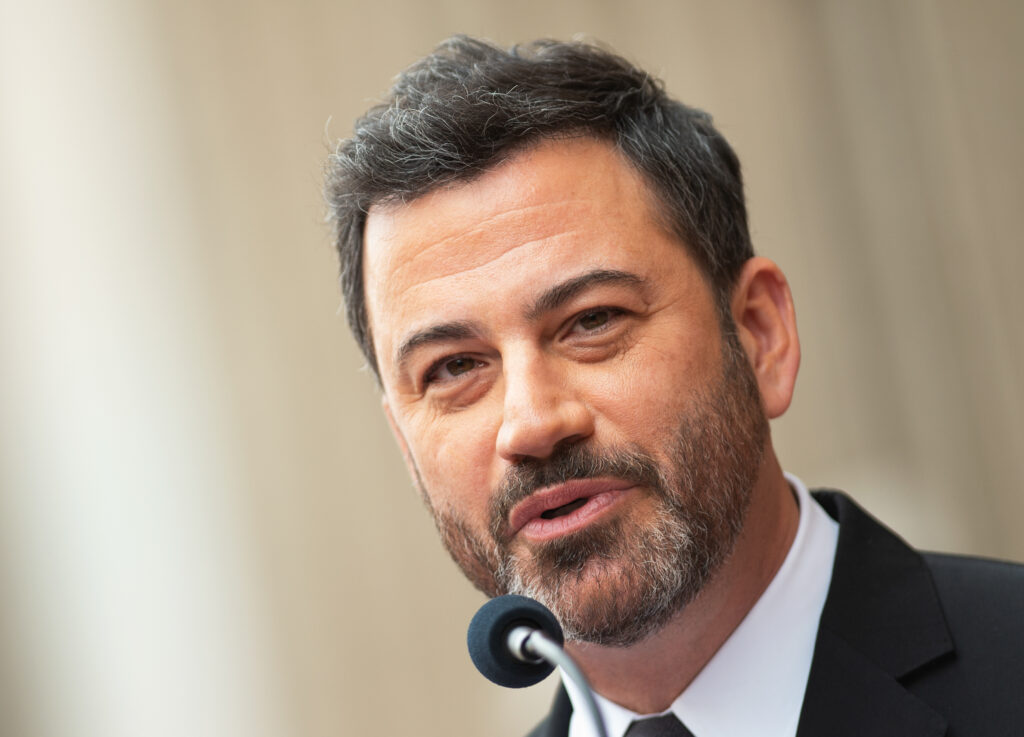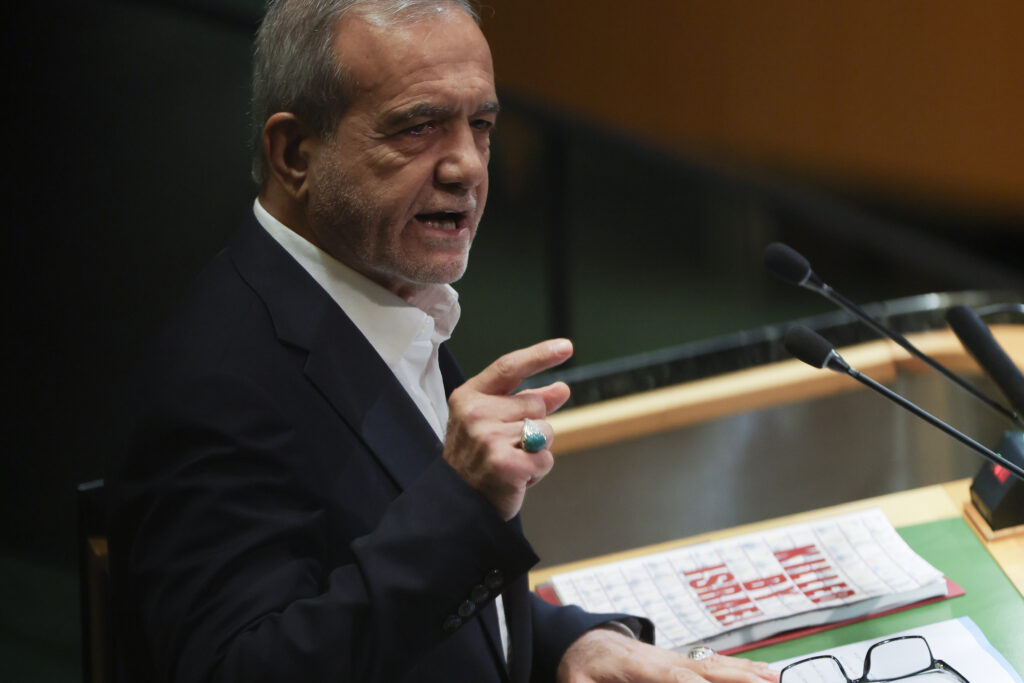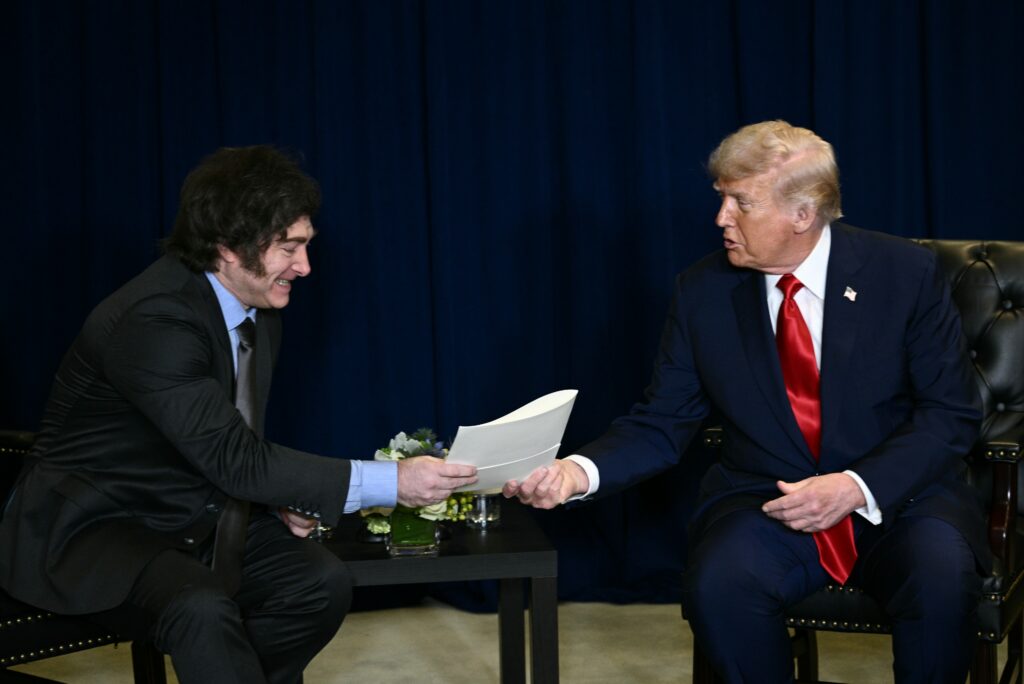US comedian Kimmel calls Trump threats ‘anti-American’
TV host Jimmy Kimmel defended free speech when he returned to US screens on Tuesday, calling government pressure on his late-night talk show “anti-American” as critics decried his suspension as an attack on constitutional rights.In his opening monologue, an emotional Kimmel praised the public outrage — which came from both left and right — over his suspension, as President Donald Trump once again threatened to sue ABC, the TV network that carries the show.”A government threat to silence a comedian the president doesn’t like is anti-American,” Kimmel said to wild applause.”Our government cannot be allowed to control what we do and do not say on television.”Kimmel, who frequently skewers Trump and his inner circle, raised the ire of conservatives last week when he said “the MAGA gang” was trying to exploit the college campus murder of right-wing activist Charlie Kirk.On Tuesday he struck a conciliatory note. “It was never my intention to make light of the murder of a young man,” he said, his voice cracking.Kimmel’s suspension last week was praised by Trump and the 79-year-old Republican swiftly attacked ABC for allowing the comedian’s return.”I think we’re going to test ABC out on this. Let’s see how we do. Last time I went after them, they gave me $16 Million Dollars. This one sounds even more lucrative,” he wrote on social media shortly before the show aired.It was not immediately clear what legal grounds Trump might think he has.Previous suits against media firms — including the one against ABC — were largely viewed as meritless, but settled seemingly as a way to appease the president.Chuck Schumer, the senior Democratic senator, called the row “a test of democracy” and said Trump “wants to be king.””Trump seems to have this penchant — anyone he doesn’t agree with, he wants to shut up,” he said Wednesday. “That’s a dagger to the heart of America.”Audience members who had watched the Hollywood taping told AFP that Kimmel had struck the right tone.”He spoke really eloquently and he gave like a lot of love to everyone who’s been hurt,” said Katie Persico, 34.”I felt like I was part of history a little bit for free speech.”- Boycott -The latest bust-up between the Trump administration and critics in the media unfolded last week when Federal Communications Commission (FCC) Chairman Brendan Carr appeared to threaten the licenses of ABC affiliates broadcasting the show unless they demanded Kimmel’s removal.Two companies that own dozens of those affiliates — Nexstar and Sinclair — then announced they would be removing the show from their schedules, prompting Disney to suspend the show nationwide.Sinclair — which last week demanded Kimmel apologize to Kirk’s family and make a donation to his right-wing activist group Turning Point USA — said Monday that its affiliates would still not be broadcasting the show when it resumed.On Tuesday, Nexstar followed suit.This meant the show remained off the air in several of the largest US television markets, including Washington DC, New Orleans, Nashville and Seattle.Kimmel’s abrupt disappearance from the airwaves sparked fury in liberal circles, with opponents saying he had been targeted because of his criticism of Trump.Opponents saw it as the latest step in creeping government control of free speech, a right enshrined in the country’s constitution.Some on the political right were also uneasy, including Trump allies such as Senator Ted Cruz and firebrand broadcaster Tucker Carlson.Trump often complains about negative coverage of him, going so far last week as to call it “illegal,” and has sued several media organizations.Disney, which owns ABC, faced backlash after suspending Kimmel. A rash of consumer cancellations followed along with a wave of reproach from creators and Hollywood insiders over what many saw as a spineless response to government bullying.By Monday, Disney had backtracked, saying the suspension had been an effort to “avoid further inflaming a tense situation” but adding it would bring back the show after “thoughtful conversations with Jimmy.”
Typhon Ragasa : la rupture d’une digue fait au moins 14 morts à Taïwan (nouveau bilan)
Au moins 14 personnes sont mortes après la rupture d’une digue naturelle formée sur une rivière par un glissement de terrain dans l’est de Taïwan, ont annoncé mercredi les autorités de l’île.Le précédent bilan de 17 morts dans le comté de Hualien, à l’est de l’île où a eu lieu la catastrophe, a été revu à la baisse, en raison de décès comptés deux fois. Les autorités locales tentent toujours de confirmer le nombre de personnes portées disparues.”C’était comme l’éruption d’un volcan…. Les eaux boueuses de la crue ont déferlé directement sur le premier étage de ma maison”, a raconté à l’AFP Hsu Cheng-hsiung, 55 ans, un responsable de quartier de Kuang Fu.La rupture, qui s’est produite mardi alors que le super typhon Ragasa frappait l’île, a libéré les eaux d’un lac qui s’était formé dans la partie supérieure de la rivière Mataian, emportant un pont, inondant une ville voisine et piégeant des centaines de personnes.”Le temps est compté” pour les secours, a déclaré la ministre de l’Intérieur Liu Shyh-fang lors d’une conférence de presse.Elle a précisé que le gouvernement taïwanais allait continuer de surveiller le lac, même s’il est prévu que la pluie se calme dans la soirée.Le niveau de l’eau dans le lac a baissé de 75%, a annoncé l’agence semi-officielle Central News Agency, citant le gouvernement.Dans la commune de Kuang Fu, des journalistes de l’AFP ont traversé des rues recouvertes d’une épaisse boue grise après les inondations, constatant que des arbres tombés bloquaient le passage.Des voitures et scooters accidentés gisaient au bord de la route ou étaient empilés les uns sur les autres, et certains portails métalliques et toits de maisons étaient détruits, avec des meubles éparpillés dans les rues.Les habitants ont confié qu’il y avait trop de boue pour nettoyer par eux-mêmes et que davantage d’aide pour le nettoyage était attendue demain.”J’avais très peur… À environ 500 mètres devant moi, le ruisseau s’est soudainement transformé en inondation”, a déclaré Shih Hui-mei, une personne venue volontairement en aide à la communauté.”J’ai entendu la police crier dans la rue a l’aide d’un haut parleur: ‘L’eau arrive, courez!’,” a-t-elle déclaré à l’AFP depuis un abri de fortune.Le premier ministre Cho Jung-tai s’est rendu sur place mercredi, promettant de venir en aide aux sinistrés.Les autorités devront, selon le ministre, enquêter sur la raison pour laquelle “les ordres d’évacuation n’ont pas été exécutés dans la zone affectée”, ce qui a entraîné des pertes humaines.Taïwan fait régulièrement face à des typhons entre juillet et octobre.Le changement climatique augmente toutefois leur intensité, avec de fortes précipitations, des crues soudaines et de puissantes rafales de vent, selon les scientifiques.
Le monde répond à Trump sur le climat, la Chine en tête
Les dirigeants de 120 pays défendront mercredi lors d’un mini-sommet à New York la poursuite de la lutte contre le dérèglement du climat, un jour après la charge de Donald Trump, même si beaucoup sont eux-mêmes encore loin de dépenser assez face à l’effort requis.”C’est la plus grande arnaque jamais menée contre le monde”, a déclaré le président américain mardi à l’ONU. Les prévisions climatiques viennent de “gens stupides qui ont fait dépenser des fortunes à leurs pays”.Mercredi, le Premier ministre chinois Li Qiang sera le premier dirigeant à la tribune pour offrir un contrepoint. Son pays, dont les usines, les centrales, les véhicules et autres activités rejettent près de 30% des gaz à effet de serre de l’humanité, est attendu sur un chiffre crucial: son engagement de réduction des émissions d’ici 2035. Jamais la Chine ne s’est engagée à un chiffre précis à court ou moyen terme. Elle s’est fixé la neutralité carbone d’ici 2060 et promettait jusqu’à présent d’atteindre un pic avant 2030, ce qu’elle semble en voie de réaliser avec cinq ans d’avance grâce à l’essor formidable du solaire et des voitures électriques. La plupart des pays riches ont passé leur pic depuis des décennies mais n’ont pas de plan crédible pour aller jusqu’à zéro dans 25 ans.Les discours s’enchaîneront à partir de 14H00 (18H00 GMT). Des dizaines de pays vulnérables sont au programme, dont l’Etat antillais de Saint-Christophe-et-Niévès.Son Premier ministre, Terrance Michael Drew, déclare à l’AFP qu’il profitera de la tribune pour montrer que le changement climatique est bien une réalité, répondant respectueusement à Donald Trump: les algues qui prolifèrent, les tempêtes qui arrivent plus tôt…”Tout cela est causé par un changement climatique accéléré, qui menace notre pilier économique le plus important: le tourisme”, explique le dirigeant.”Tous les regards sont tournés vers la Chine”, dit à l’AFP Li Shuo, expert au centre de réflexion Asia Society Policy Institute, bien renseigné à Pékin.Lui s’attend à un objectif de réduction conservateur, autour voire en dessous de -10% sur les dix prochaines années. Une trajectoire qui décevra par rapport à l’effort général requis, mais aura le mérite de démontrer l’attachement de Pékin au multilatéralisme climatique.- COP30 difficile -Le secrétaire général Antonio Guterres n’a convié au sommet que les pays prêts à présenter un engagement pour 2035. C’est une obligation de l’accord de Paris de 2015: les pays membres, soit la quasi-totalité de la planète sauf une poignée dont l’Iran, la Libye, le Yémen et bientôt les Etats-Unis, fixent librement leurs objectifs mais doivent les rehausser tous les cinq ans. L’Inde est l’autre grande absente du sommet, avec les Etats-Unis.Même parmi les invités, beaucoup restent de grands producteurs ou consommateurs de pétrole et de charbon, et les engagements s’annoncent peu ambitieux.La plupart des feuilles de route ont du retard, le plus spectaculaire étant celui de l’Union européenne, où France et Allemagne négocient des garanties financières pour la transition de leur industrie.”Il y a un défaut d’ambition de la part des pays qui sont traditionnellement des leaders, et qui deviennent des traînards sur le climat”, a déclaré Ilana Seid, diplomate des îles Palaos qui représente un groupe de petites îles.Ce qui renforce l’attente pour la feuille de route chinoise. Elle permettra de recalculer la trajectoire mondiale avant la conférence de l’ONU en novembre au Brésil (COP30), qui s’annonce difficile.”Les COP ne sont pas des événements isolés. Elles reflètent les tensions géopolitiques”, dit à l’AFP la directrice générale de la COP30, Ana Toni.
Iran will never seek nuclear weapons, president tells UN
Iran’s president repeated Wednesday that his country is not seeking nuclear weapons, after military strikes by Israel and the United States earlier this year, and impending sanctions triggered by European powers.”I hereby declare once more before this assembly that Iran has never sought and will never seek to build a nuclear bomb,” President Masoud Pezeshkian told the United Nations General Assembly.”The one disturbing peace and stability in the region is Israel, but Iran is the one that gets punished,” he said.Iran has long contended that it is not seeking nuclear weapons, pointing to an edict by Supreme Leader Ayatollah Ali Khamenei, and US intelligence has not concluded that the country has decided to build a nuclear weapon.But Israel, the United States and European countries have long been skeptical due to the country’s advanced nuclear work, believing it could quickly pursue a bomb if it so decided.Britain, France and Germany have moved to reimpose UN sanctions that had been suspended under a 2015 nuclear deal that was negotiated by the United States and then torn up by US President Donald Trump.The sanctions are set to go into effect on Saturday. Iranian Foreign Minister Abbas Araghchi met Tuesday with his European counterparts, leading to no clear headway other than an agreement to keep talking.Pezeshkian accused the Europeans of bad faith, saying that Iran’s lack of cooperation was in response to Trump’s withdrawal from the nuclear deal, formally known as the Joint Comprehensive Plan of Action (JCPOA).”They falsely presented themselves as parties of good standing to the agreement, and they disparaged Iran’s sincere efforts as insufficient,” Pezeshkian said.”All of this was in pursuit of nothing less than the destruction of the very JCPOA which they themselves had once held as a foremost achievement.”Standing at the General Assembly rostrum, Pezeshkian showed pictures of people killed in the Israeli military campaign against Iran, which Tehran says killed more than 1,000 people.”Aerial assaults of the Zionist regime and the United States of America against Iran’s cities, homes and infrastructure at the very time we were treading the path of diplomatic negotiations constituted a grave betrayal of diplomacy,” he said.
Angola groups urge UN to investigate deadly July crackdownWed, 24 Sep 2025 14:59:26 GMT
Leading Angola civil society groups have called on the United Nations to investigate a police crackdown on unrest two months ago when around 30 people were killed.A July 28-30 taxi strike against fuel price hikes in the oil-rich nation exploded into protests and looting, with security forces responding with live ammunition and sweeping arrests.In an …
Angola groups urge UN to investigate deadly July crackdownWed, 24 Sep 2025 14:59:26 GMT Read More »
US Treasury says in talks to support Argentina’s central bank
US Treasury Secretary Scott Bessent said Wednesday that Washington is in talks with Argentina for a swap line allowing the country access to billions of dollars, as its right-wing leader Javier Milei seeks to calm markets ahead of midterm elections.After Bessent’s remarks, Argentina’s currency rose 2.4 percent to 1,333.90 pesos to the US dollar.”The Treasury is currently in negotiations with Argentine officials for a $20 billion swap line with the Central Bank,” Bessent said in a social media post, a day after he and President Donald Trump spoke with Milei.The United States is also ready to buy the country’s dollar bonds, Bessent added on X.Milei, a key Latin American ally of Trump, thanked the US president and Bessent for their “support and confidence.”Swap lines are transactions in which two central banks agree to swap their currencies at a set exchange rate for a specified period.Trump said Tuesday on the sidelines of the UN General Assembly in New York that although the United States would help Argentina, “I don’t think they need a bailout.”The Argentine peso had fallen sharply after Milei’s party was beaten by the center-left Peronist movement in a Buenos Aires provincial election on September 7.The vote was seen as a litmus test for national legislative elections scheduled for October 26.Bessent added Wednesday that the US Treasury “stands ready to purchase Argentina’s USD bonds and will do so as conditions warrant,” among other measures.”As President Trump has stated, we stand ready to do what is needed to support Argentina,” he wrote.He said that the South American country “has the tools to defeat speculators, including those who seek to destabilize Argentina’s markets for political objectives.”Trump earlier said he was giving Milei his “full endorsement,” while Bessent said at the start of the week that “all options for stabilization are on the table.”But the Trump administration’s plans have also raised questions domestically. Senator Elizabeth Warren, the top Democrat on the Senate Banking Committee, wrote a letter dated Monday to Bessent seeking further information about a potential “bailout” of Argentina.”It is deeply troubling that the president intends to use significant emergency funds to inflate the value of a foreign government’s currency and bolster its financial markets,” she said.Bessent shot back at Warren’s criticism, saying she and others “failed to act when presented with a historic opportunity to stabilize Latin America economically and geopolitically during the Obama years.”Free-marketeer Milei’s election was cheered by investors in 2023 but he has begun to hemorrhage support after two years of biting austerity and a corruption scandal involving his sister.




